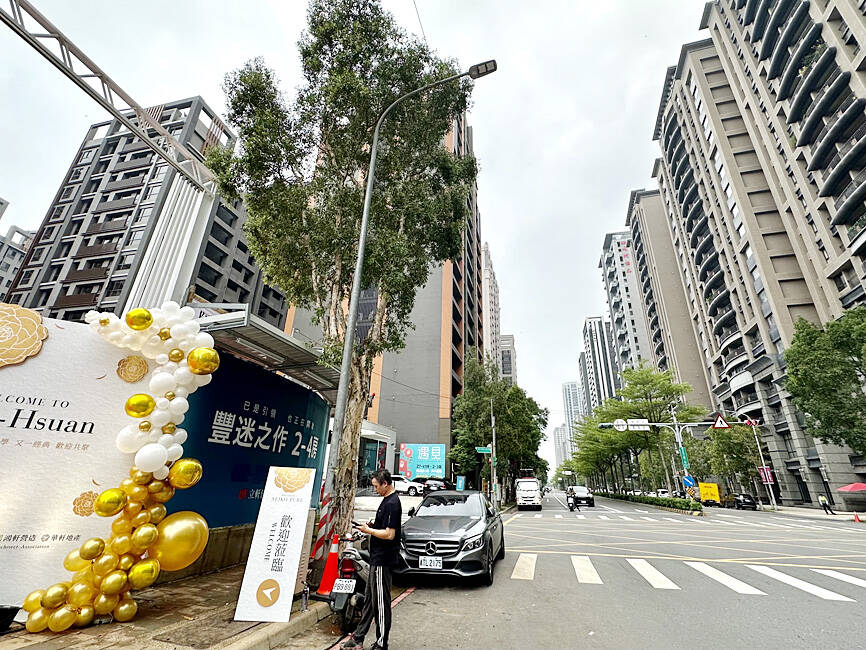The business climate monitor for presale residential projects and new houses in northern Taiwan last month turned “yellow-red,” the first signal indicating a boom in 16 years, My Housing Monthly (住展雜誌) said yesterday.
The total score of constituent measures stood at 52.6, rising from 45.1 in February and ending 15 consecutive months of “green” signals, which suggests steady growth, My Housing Monthly spokesman Chen Ping-chen (陳炳辰) said.
The impressive showing came after developers released NT$100 billion (US$3.09 billion) of presale projects in northern Taiwan to take advantage of the spring sales season, which started late last month and runs until the end of this month, Chen said.

Photo: Hsu Yi-ping, Taipei Times
Projects in New Taipei City’s Tamsui District (淡水) and Sanchong District (三重), Taoyuan’s Gueishan District (龜山) and Hsinchu County’s Baoshan Township (寶山) are an easy sell, he said.
Favorable lending terms, chiefly interest rate subsidies for first-home purchases, also helped expedite transactions, he said.
The magazine said the measure on price concessions went down to 9.92 percent, as buyers were generally willing to increase their budgets, while sellers mostly refused to budge.
The reading on buying interest was little changed at 7.48, it added.
Chen said that the momentum would sustain through the first half of this year, as the new administration of president-elect William Lai (賴清德) would boost expectations of reforms.
Sinyi Realty Inc (信義房屋), the nation’s sole listed broker, arrived at similar conclusions in a report released on Wednesday, saying transactions of presale projects totaled 19,000 units in the first two months and generated NT$320.2 billion of sales.
The volume represented a sharp increase of 150 percent from a year earlier when the government’s plan to bar transfers of presale house purchase agreements sidelined developers and potential buyers, Sinyi research manager Tseng Ching-der (曾敬德) said.
The sentiment started to turn around in the fourth quarter of last year when exports, Taiwan’s main GDP growth driver, increased after several quarters of inventory adjustments, Tseng said.

MULTIFACETED: A task force has analyzed possible scenarios and created responses to assist domestic industries in dealing with US tariffs, the economics minister said The Executive Yuan is tomorrow to announce countermeasures to US President Donald Trump’s planned reciprocal tariffs, although the details of the plan would not be made public until Monday next week, Minister of Economic Affairs J.W. Kuo (郭智輝) said yesterday. The Cabinet established an economic and trade task force in November last year to deal with US trade and tariff related issues, Kuo told reporters outside the legislature in Taipei. The task force has been analyzing and evaluating all kinds of scenarios to identify suitable responses and determine how best to assist domestic industries in managing the effects of Trump’s tariffs, he

TIGHT-LIPPED: UMC said it had no merger plans at the moment, after Nikkei Asia reported that the firm and GlobalFoundries were considering restarting merger talks United Microelectronics Corp (UMC, 聯電), the world’s No. 4 contract chipmaker, yesterday launched a new US$5 billion 12-inch chip factory in Singapore as part of its latest effort to diversify its manufacturing footprint amid growing geopolitical risks. The new factory, adjacent to UMC’s existing Singapore fab in the Pasir Res Wafer Fab Park, is scheduled to enter volume production next year, utilizing mature 22-nanometer and 28-nanometer process technologies, UMC said in a statement. The company plans to invest US$5 billion during the first phase of the new fab, which would have an installed capacity of 30,000 12-inch wafers per month, it said. The

‘SWASTICAR’: Tesla CEO Elon Musk’s close association with Donald Trump has prompted opponents to brand him a ‘Nazi’ and resulted in a dramatic drop in sales Demonstrators descended on Tesla Inc dealerships across the US, and in Europe and Canada on Saturday to protest company chief Elon Musk, who has amassed extraordinary power as a top adviser to US President Donald Trump. Waving signs with messages such as “Musk is stealing our money” and “Reclaim our country,” the protests largely took place peacefully following fiery episodes of vandalism on Tesla vehicles, dealerships and other facilities in recent weeks that US officials have denounced as terrorism. Hundreds rallied on Saturday outside the Tesla dealership in Manhattan. Some blasted Musk, the world’s richest man, while others demanded the shuttering of his

Taiwan’s official purchasing managers’ index (PMI) last month rose 0.2 percentage points to 54.2, in a second consecutive month of expansion, thanks to front-loading demand intended to avoid potential US tariff hikes, the Chung-Hua Institution for Economic Research (CIER, 中華經濟研究院) said yesterday. While short-term demand appeared robust, uncertainties rose due to US President Donald Trump’s unpredictable trade policy, CIER president Lien Hsien-ming (連賢明) told a news conference in Taipei. Taiwan’s economy this year would be characterized by high-level fluctuations and the volatility would be wilder than most expect, Lien said Demand for electronics, particularly semiconductors, continues to benefit from US technology giants’ effort